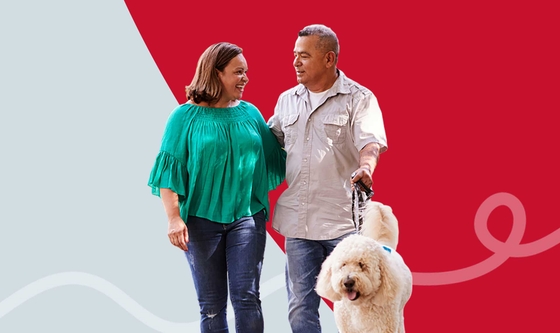
Feeling blue after a heart attack? You’re not alone
Media release: Friday 10 October 2025
How to beat the ‘cardiac blues’ this World Mental Health Day
People in Australia living with heart disease, including a history of heart attack, are being encouraged to recognise the ‘cardiac blues’ this World Mental Health Day and seek help early for improved health outcomes.
With more than four million people in Australia living with a cardiac condition and on average one person every nine minutes hospitalised due to a heart attack every day1, the Heart Foundation is today highlighting the intersect between mental health and heart health.
What is the cardiac blues and how can it be kept at bay?
Around 75 per cent of people who have had a heart event experience the ‘cardiac blues’2.
The cardiac blues may include symptoms such as:
- Loss of interest in usual activities and withdrawal from others.
- Becoming tearful and crying easily.
- Sleep problems or change in appetite.
- Confusion or forgetfulness or an inability to concentrate.
- Worry about a recurring heart event.
Heart Foundation Senior Healthcare Programs Manager, Natalie Raffoul, said the ‘cardiac blues’ was a common response to a life-changing event such as a heart attack or being diagnosed with heart disease, but the good news is, it is often temporary and manageable with the right support.
“Surviving a heart event or being diagnosed with coronary heart disease is life-changing and the emotional impact is often underestimated,” Ms Raffoul said.
“We know that most people experience at least some symptoms of emotional distress at the time, or soon after, an acute heart event. Feelings of anxiety, fear and sadness are normal, and it’s important to keep in mind that the feeling of the ‘cardiac blues’ can resolve with time and support.”
Ms Raffoul said the first step in overcoming the cardiac blues is recognising the symptoms and seeking support. Other recommendations include staying connected to family and friends, keeping active, and joining a cardiac rehabilitation program or peer support group to find others on a similar recovery journey.
“Finding someone you feel comfortable talking to is an important step to recovery. It could be someone in your healthcare team, a family member, or a friend,” Ms Raffoul said.
“For some people however, these symptoms can linger. Almost half of people still experience symptoms of depression or anxiety six months after leaving hospital after a heart attack
“The Heart Foundation offers a free 12-week tailored support program for people recovering from a heart attack or living with heart disease called ‘MyHeart MyLife’ and we know many people with the cardiac blues who have found support, community, connection through this program.
“If your mood is not improving or is getting worse during the months after your heart event you should seek professional help by contacting your doctor or reaching out to a mental health support service like Lifeline.”
The complex intersect between mental health and cardiovascular disease
Ms Raffoul said while the cardiac blues was a common response to having a heart attack or being diagnosed with heart disease, people living with severe mental illness are also at a higher risk of developing cardiovascular disease.
“Mental health and cardiovascular disease have a bi-directional relationship,” Ms Raffoul said.
“Whilst having heart disease can increase your chances of developing a mental health condition, we also know that severe mental illness is associated with a 37% increased risk of cardiovascular events.
“It’s critical that we understand the impact of mental health in relation to our heart health because it can contribute to recurrent events and reduced quality of life.”
When it comes to cardiovascular recovery, community is crucial
Professor Adrienne O’Neil, a researcher the Heart Foundation has previously funded for her work on improving the health outcomes of people experiencing negative emotions after a heart attack, agreed that the power of community played a key role in recovery.
“We found that 91 per cent of cardiac rehabilitation practitioners include education on the signs and symptoms of depression and anxiety in their programs. For most patients, these symptoms will resolve in the ensuing months without therapeutic intervention,” Prof O’Neil said.
Prof O’Neil said it was important for someone experiencing mental health challenges post heart event to connect with others who had a similar lived experience, as well-meaning friends and family may not be able to fully relate.
“Interestingly, being socially isolated can increase someone’s chance of having another heart event – that’s how important being connected with others is,” Prof O’Neil said.
“Attending a structured cardiac rehabilitation program is a great thing to do as not only will the clinicians running the program monitor and educate you about your mental health but being around others who have experienced a similar event to you is very useful. We have shown that attending cardiac rehabilitation is associated with fewer hospital readmissions and reduced length of stay.”
Support available through Heart Foundation’s ‘MyHeart MyLife’ program
More than 4,600 people in Australia have joined the Heart Foundation’s digital MyHeart MyLife support program since it launched a year ago. Early evaluation data shows 87 per cent of participant survey respondents improved their knowledge and understanding of their heart condition by participating in the program.
“We find after a heart event people have many questions about everyday life and need reassurance—from lifestyle advice, information on medicines to practical tips such as how soon they can drive, when they can fly or what’s best to eat for heart health,” Ms Raffoul said.
In addition to its 12-week support program for people recovering from a heart attack and living with coronary heart disease, the Heart Foundation runs a free online peer support community via a private Facebook group connecting people living with a heart condition, with carers welcome too.
Victora finds support through MyHeart MyLife
32-year-old Victoria Swanbury from NSW has lived with congenital heart disease since birth. After a series of unexpected heart surgeries in 2019, she identified mental health challenges including the cardiac blues and said the MyHeart MyLife Facebook peer support group helped her know she’s not alone.
“The psychological journey of a heart condition is not often spoken about, and it is one I truly believe needs to have more light shed on it. The mind always remembers what the heart never forgets,” Victoria said.
“It’s tougher to process than you expect, but it’s important to remember that talking about it is okay. Everyone’s experience is different and whether it’s a heart attack or lifelong heart issues, each situation is difficult in its own way. Having another avenue for support, or a sounding board, is immensely helpful.
“I had the support of my family and friends, but I didn’t know anyone else who had been through something as traumatic. It was only after my second open heart surgery that I began to recognise that I needed mental health support.
"In terms of support, most people come from a good place but being able to relate and have a community of people who understand what you're going through is hard to find, but you do find that in the MyHeart MyLife group."
For information on the Heart Foundation’s MyHeart MyLife online peer support community visit: https://www.facebook.com/groups/myheartmylifecommunity/
For the free 12-week MyHeart MyLife patient support program visit: www.myheartmylife.org.au
For mental health support, speak to your doctor or call:
About the MyHeart MyLife program
- MyHeart MyLife is a free, 12 week tailored digital support program to improve the physical and emotional health and wellbeing of people living with coronary heart disease.
- The program uses a combination of online articles, videos, expert tips and practical tools as well as motivational emails and text messages to help participants better understand and manage their condition and make heart-healthy choices to live well with heart disease.
- Participants also have access to the MyHeart MyLife Facebook community, connecting them with others living with a heart condition who understand what they are going through.
You might also be interested in...

MyHeart MyLife
Your next step towards recovery and living well with heart disease

Mental health and heart disease
Having a mental health condition can have a negative impact on your heart health and increase your risk of heart disease.

A team effort – your heart and your mind
Struggling with your mental health after a heart event is normal. It is not uncommon for people to experience anxiety, depression, and stress – there is even a name for it, the ‘cardiac blues.’
Last updated20 October 2025